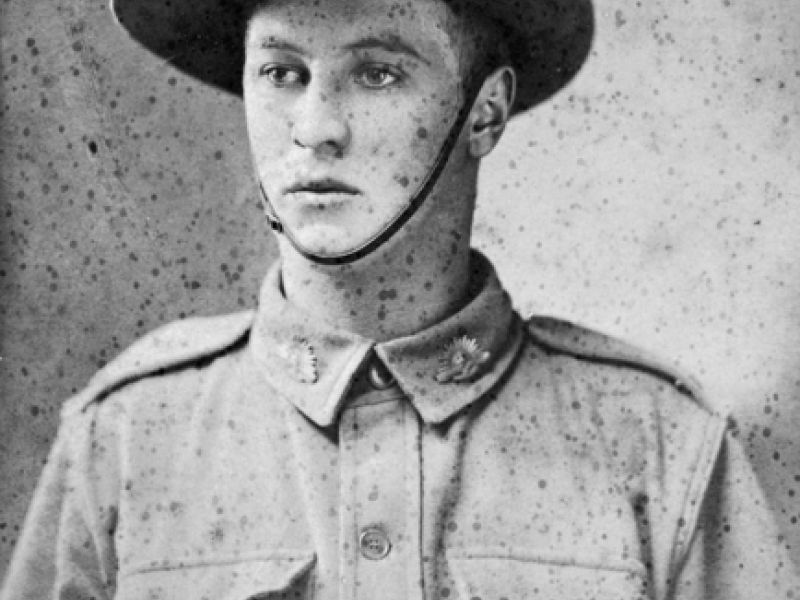903A Trooper Clive Roberts, 3rd Australian Light Horse Regiment
Clive Roberts was born on 13 October 1897 in the Adelaide suburb of Glenelg, the third of four sons born to Glenelg mayor Alfred Roberts and his wife Isabel. Young Clive received his education at the local grammar school and later attended St Peter’s College where he was a keen athlete, playing cricket, football, tennis and swimming. On completion of his education, he moved to a settlement called Hummock Hill, near Whyalla, where he worked as an engineer with Broken Hill Proprietary Company.
Clive Roberts enlisted in the Australian Imperial Force on 22 February 1915. He was assigned to D Company of the 27th Battalion and began a short period of training in Australia. He embarked for active service from Adelaide on 31 May that year, sailing on board the troopship Geelong.
After several weeks at sea, Private Roberts arrived in Egypt where he undertook further training. He joined his unit on the Gallipoli peninsula in early November and spent the following weeks engaged in defensive work and trench maintenance. His unit was evacuated from Gallipoli less than a month later as the allies abandoned the campaign.
Private Roberts returned to Egypt with his unit and later that month was transferred to the 3rd Light Horse Regiment, alongside his older brother Ewart. His regiment then joined the newly-formed Anzac Mounted Division before being deployed to protect the Nile valley from bands of pro-Turkish Senussi Arabs. In May, his unit, as part of the 1st Light Horse Brigade, joined in the defence of the vital Suez Canal.
Roberts was drawn into his first major battle of the war at Romani in early August 1916, when members of the Anzac Mounted Division repulsed a major Turkish advance on the canal.
After spending a few days pursuing the retreating enemy, the 3rd Light Horse Regiment was withdrawn for a period of rest. In October, Roberts left his unit to undertake a trade test in an attempt to join the Flying Corps, but was seemingly unsuccessful. He re-joined the Light Horse in November, taking part in the Allied advance across the Sinai Desert. Their advance was halted on the Palestine frontier in December 1916 where Turkish forces had developed strongholds at Magdhaba and Rafa. Robert’s unit took part in the attack on Magdhaba later that month, with the stronghold falling to allied forces within hours of their advance.
With Magdhaba secured, the next objective was Rafa, which was essential to opening the way into Palestine. Robert’s unit attacked Turkish positions at Rafa on 7 January 1917, quickly advancing and surrounding it before dawn. The subsequent attack progressed slowly, however, and the later advance of two large groups of enemy reinforcements, combined with a lack of supplies and reserves, prompted the attack to be abandoned. Some units ignored orders to withdraw, however, and quickly closed in on the enemy’s positions. Rafa’s defences fell rapidly in the wake of the allied advance, leading to its capture the following morning, at a cost of around 100 casualties. Among the dead was Trooper Clive Roberts, who had been killed in action while attempting to save a wounded comrade.
Corporal Graham Dow described Robert’s final moments in a letter home saying:
“About a week ago we attacked a place called Rafa on the Syrian border. The Turks were in a very strong position and late in the afternoon our squadron (after being under terrific rifle and machine gun fire the whole day) had to retire. Previously Major Lance Lewis had been badly wounded and in the retirement he was left behind. It was pretty rotten, I can tell you. Another fellow and I stayed to bring the Major in and about half way up the ridge Clive ran down to give a hand. ‘I’ll help, I can hold his head up’ he said. Just then he was hit. He toppled over sideways and died instantly…The bullet had entered his back and went through his heart. Poor boy… we all felt it keenly, he was such a favourite. Everyone liked him- a fine, clean living boy and we all felt intensely sorry for his people at home. They can rest assured he died a brave man in an attempt to help a wounded comrade. If I have to pass out I hope that I will meet death in as brave a manner as he did.”
Trooper Robert’s body was later recovered from the battlefield and he was buried at Kantara War Memorial Cemetery where his remains lie today beneath the inscription chosen by his family, “Faithful unto death”
- Australian War Memorial https://www.awm.gov.au/collection/R1665501

 Australian War Memorial
Australian War Memorial